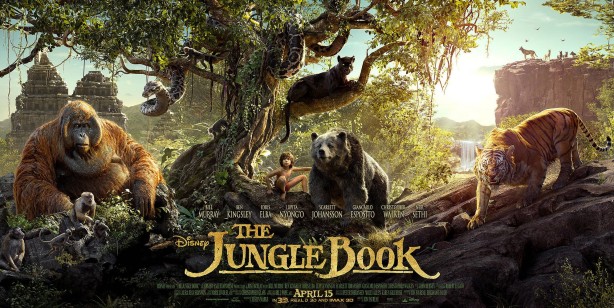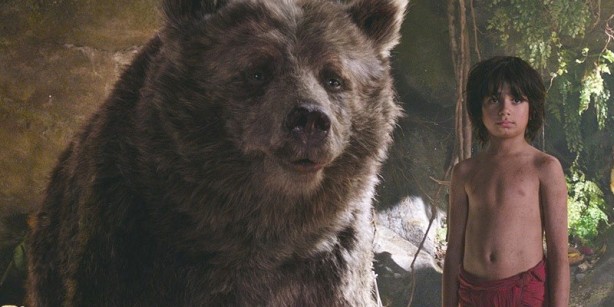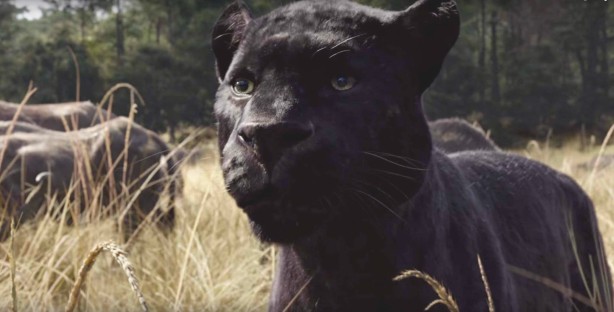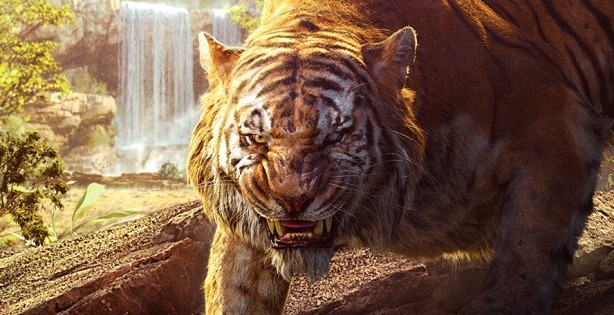
I have zero connection to Disney movies.
Even as a child, I was already too grown-up for their fake worldview.
I am a better person for it. Disney is a disease that infects children with unrealistic expectations. Director Jon Favreau does an admirable job subverting the classic expectations of Disney movies as much as possible. But the cheese is overwhelmingly ham-handed and inescapable.
Of course, this is still a children’s movie—first and foremost. Like most kids movies, they sell audiences on the bullshit line that it’s for children but can also be enjoyed by adults. While Favreau performed substantially better than most would in his position, that balancing act is very visible.

Before we get into spoiler territory, let’s talk about what works. Above all, The Jungle Book is a success because Disney nailed their casting of Mowgli. Neel Sethi was phenomenal and picture-perfect for the role. Few child actors could pull of the physicality needed for Mowgli to move throughout the jungle in a realistic fashion while also believably interacting with CGI animals. Apparently, The Jim Henson Creature Shop was wisely brought in to fabricate puppets to serve as reference points for Neel Sethi. However, this movie probably doesn’t work remotely as well with any other child actor.
You have to love Mowgli because this is his journey and you are with him every step.

Bill Murray is always a welcome presence, and he does a superb job bringing Baloo (the bear) to life. The character depiction perfectly matches Bill Murray’s voice and delivery. The third casting choice that Disney had to perfect was Shere Khan (the tiger) because he’s the villain that you must fear and despise. Idris Elba reveled in this opportunity and he chews ample scenery. As a result, Shere Khan is the correct mix of menace and power. I could do without every other casting decision.
I understand why they would want to cast Ben Kingsley as Bagheera (the panther)—especially considering the backstory of the book in the context of India. I mean, he’s fucking Gandhi. But it felt like a decision obligated more out of politics/commercial incentives instead of a character-based decision. Personally, it feels like Ben Kingsley mailed it in—either that or he’s not a good voice actor. Emotionally, Bagheera feels flat. While he may have intended for it to come across as regal, Ben Kingsley’s delivery feels like he’s bored and divorced from what is happening on the screen.

For a completely computer-generated movie (except for Neel Sethi), The Jungle Book breaks new ground and deserves praise for being a technological achievement. As usual, the 3D is completely unnecessary and I think it would drastically detract from the visuals. While there is a certain disconnect between the voice actors and CGI animals moving their mouths, I was able to forgive and forget that these were actors in a sound booth. You just have to go with it because you can only do so much to replicate how voices echo through the space and density of a computer-generated jungle.
Although it may look silly 5-10 years later, this is an important step in CGI development.
Now that I’ve praised this enough, let’s get down to talking some shit about a children’s movie.
Spoilers galore.
A surprising amount of death occurs in The Jungle Book.
However, no real violence is shown when a death happens, but the character completely disappears from the story without so much as a lingering shot. This occurs multiple times. Maybe I’m guilty of overanalyzing, but I believe you negate the impact of the death you’re showing by just breezing right past it. Mufasa’s death in The Lion King makes a monumental impression because they show the act and direct aftermath—Simba seeing the body of his dead father and mourning him.
Whereas in The Jungle Book, it’s impossible to tell whether or not some characters actually died—specifically Kaa and King Louie. Both of these characters feel shoehorned into the movie. I have no idea what their previous roles were in the animated movie or book, but the screen time for Kaa and King Louie appears to primarily serve as clumsy exposition to further plot points.

Kaa is a massive python s-s-seductively voiced by Scarlett Johansson. She is in one scene where she basically tells Mowgli the story of the red flower (Shere Khan killing Mowgli’s father and getting burnt badly in the process) and then tries to devour Mowgli. Somehow, Baloo silently climbs up an extremely high tree and I guess he viciously kills Kaa to save Mowgli. Remember, Baloo is a lazy, obese bear—but evidently he can climb really high steathily undetected. Kaa never reappears in the story, but you also never see Baloo kill Kaa. It’s just a roar, heavy implication, and quick cut.
King Louie appears in a similar yet even more bungled sequence. King Louie is voiced by Christopher Walken, which is so weird that it works. While King Louie is an orangutan in every other incarnation, Jon Favreau turned the character into a Gigantopithecus. Essentially, he is King Kong as an orangutan with all of the quirky personality traits of Christopher Walken. King Louie wants to learn the secret to controlling the red flower from Mowgli so he can use it for his own sinister devices.

Bagheera and Baloo track Mowgli down after he’s kidnapped by the monkeys and taken to King Louie. With their help, Mowgli escapes, but they all have to outrun and outwit King Louie. This leads to King Louie destroying his kingdom so he can try to grab Mowgli. As a result of his greed, the whole kingdom literally crumbles down on top of King Louie. These scenes make it seem like Kaa and King Louie only exist to talk about the red flower (fire), threaten to kill Mowgli, and then die.
It seems very odd as an adult, and I would imagine children must also be confused.
And apparently, all life is precious in the jungle except monkeys. Countless monkeys presumably get slaughtered—or else we’re supposed to pretend they’re made of rubber and have no bones so they can get clawed and trampled without any repercussions. Why did the monkeys get fucked over? As far as I can recall, the monkeys are also the only animals that aren’t given human voices.
That is some fucked-up shit to do to our closest DNA relatives, Fatreau.
Finally, Mowgli learns from King Louie (before he is crumbled to death) that Shere Khan killed Akela. That was also another glossed-over death because Khan attacks Akela and throws him off a cliff. It is incredibly quick, but at least that is a death that has an impact. While the wolves let Shere Khan reign supreme over their domain, Mowgli is immediately out for blood when he hears the news.

Mowgli runs to the man village to steal fire and sprints through the jungle with a lit torch.
In his haste, embers from his torch fly off and ignite the jungle. This all leads to a very stilted final stand after Mowgli miraculously runs back home in a matter of minutes (the same ground that it took him days to flee). Inevitably, Mowgli kills Shere Khan with fire—using the blaze he created by burning the jungle. But it’s all cool because elephants are natural firefighters. Problem solved!
So the lesson here is don’t play with fire…unless you have an elephant around.
I don’t know why they intentionally made the hero (Mowgli) destroy part of the jungle—even if it was by mistake. Apparently, that fire didn’t kill any other animals or destroy their habitats. Remember, elephants are magical and can fix any situation by knocking down some trees.
Despite all its faults, The Jungle Book is a good movie.
But everyone should relax on the instant classic bullshit.




